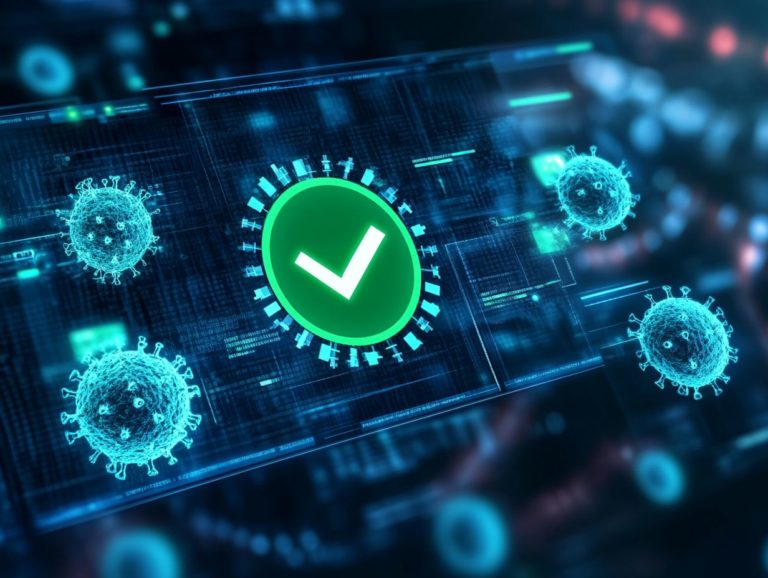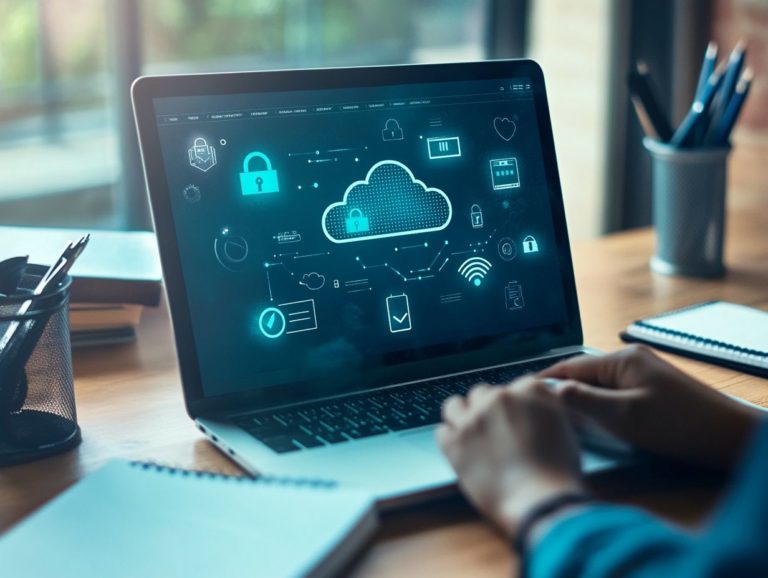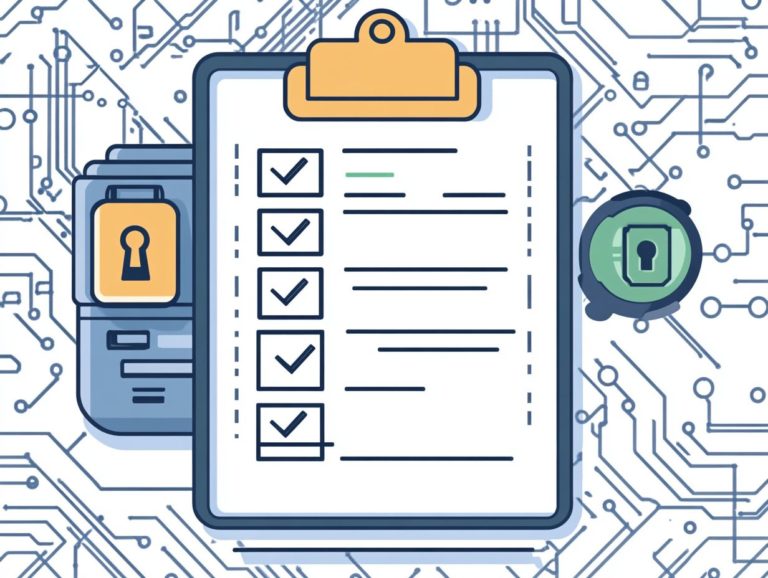how can i secure my personal devices?
In today s digital landscape, personal devices are indispensable for communication, work, and entertainment. However, this convenience comes with significant risks. Understanding personal device security is essential for safeguarding your sensitive information against potential threats.
This article explores the intricacies of personal device security, highlights the importance of protecting your gadgets, and offers practical strategies to bolster your security measures. You’ll learn about creating robust passwords and using a VPN to equip yourself with the necessary tools to keep your devices secure and your data safe.
Contents
- Key Takeaways:
- Understanding Personal Device Security
- The Importance of Securing Personal Devices
- Effective Strategies to Secure Your Devices
- Best Practices for Personal Device Security
- What to Do If Your Personal Device Is Compromised
- Final Thoughts and Recommendations
- Frequently Asked Questions
- How can I secure my personal devices?
- Why is it important to secure my personal devices?
- What type of password should I use to secure my personal devices?
- How often should I update my operating system and applications?
- Can I use any public Wi-Fi network to access the internet?
- What should I do if I suspect my personal device has been compromised?
Key Takeaways:
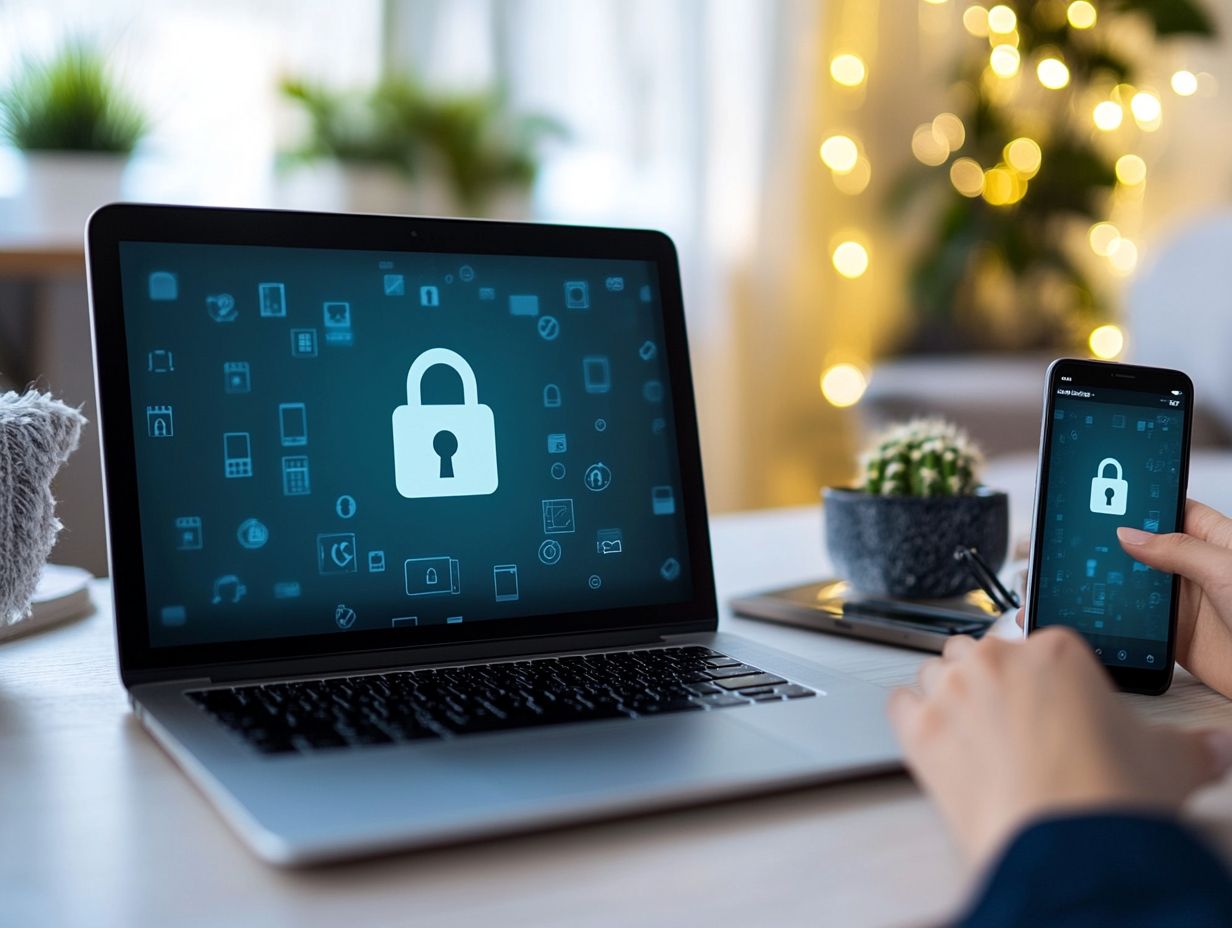
- Personal device security is essential for protecting sensitive information from cyber threats.
- Inadequate security can lead to serious consequences such as identity theft and financial loss.
- Secure your devices by using strong passwords, keeping software updated, using VPNs, and installing antivirus software.
Understanding Personal Device Security
Understanding personal device security is essential in today s digital age, where cyber threats grow more sophisticated daily. Your personal devices smartphones, tablets, and computers are treasure troves of sensitive information, including banking details, passwords, and private communications.
With mobile banking and online transactions becoming the norm, robust security measures are a necessity, not an option. By adopting practices such as device encryption, regularly updating your security software, and staying informed about potential threats, you can effectively fortify your digital space against malicious attacks.
The Importance of Securing Personal Devices
Securing your personal devices is vital in today’s digital landscape, where numerous security threats loom. Cyber attacks increasingly target personal information, and neglecting effective security measures can lead to dire consequences like identity theft, financial loss, and unauthorized access to your sensitive data. To learn more about protecting your accounts, you might ask, how can I secure my social media accounts?
The significance of internet safety cannot be overstated. Act now to protect your information! Utilize strong passwords and make it a habit to regularly back up your data. These steps are crucial for safeguarding your devices against potential breaches and ensuring your peace of mind.
Effective Strategies to Secure Your Devices
There are several effective strategies to secure your personal devices, each playing a crucial role in a comprehensive approach to security.
First, implementing security software is essential. Programs like Kaspersky and McAfee provide robust antivirus protection that can identify and neutralize threats before they escalate. Regularly updating your software, including web browsers and operating systems like Windows and macOS, is equally important. These updates often contain vital security patches that help fortify your defenses.
Using a VPN client significantly enhances your privacy. Device encryption offers an additional layer of protection for your sensitive data, ensuring it remains inaccessible to unauthorized individuals.
Strong Passwords and Biometric Authentication
Strong passwords and biometric authentication are essential for enhancing mobile device security and safeguarding your personal information from unauthorized access. A robust password should combine uppercase and lowercase letters, numbers, and special characters, making it challenging for anyone with malicious intent to guess or crack.
Biometric authentication like fingerprint or facial recognition technology provides extra security that is both convenient and difficult to bypass. To strengthen your digital defenses, avoid common passwords and incorporate a unique passphrase that resonates with you. This tactic boosts security while also aiding memorability.
As you explore biometric systems, many smartphones now feature advanced options like iris scanning and voice recognition, which offer formidable protection against unauthorized entry. However, remain vigilant about potential vulnerabilities, as even these advanced systems can be spoofed with high-resolution images or recordings.
By combining a strong password with biometric measures, you establish a powerful defense against intrusions.
Regular Software Updates
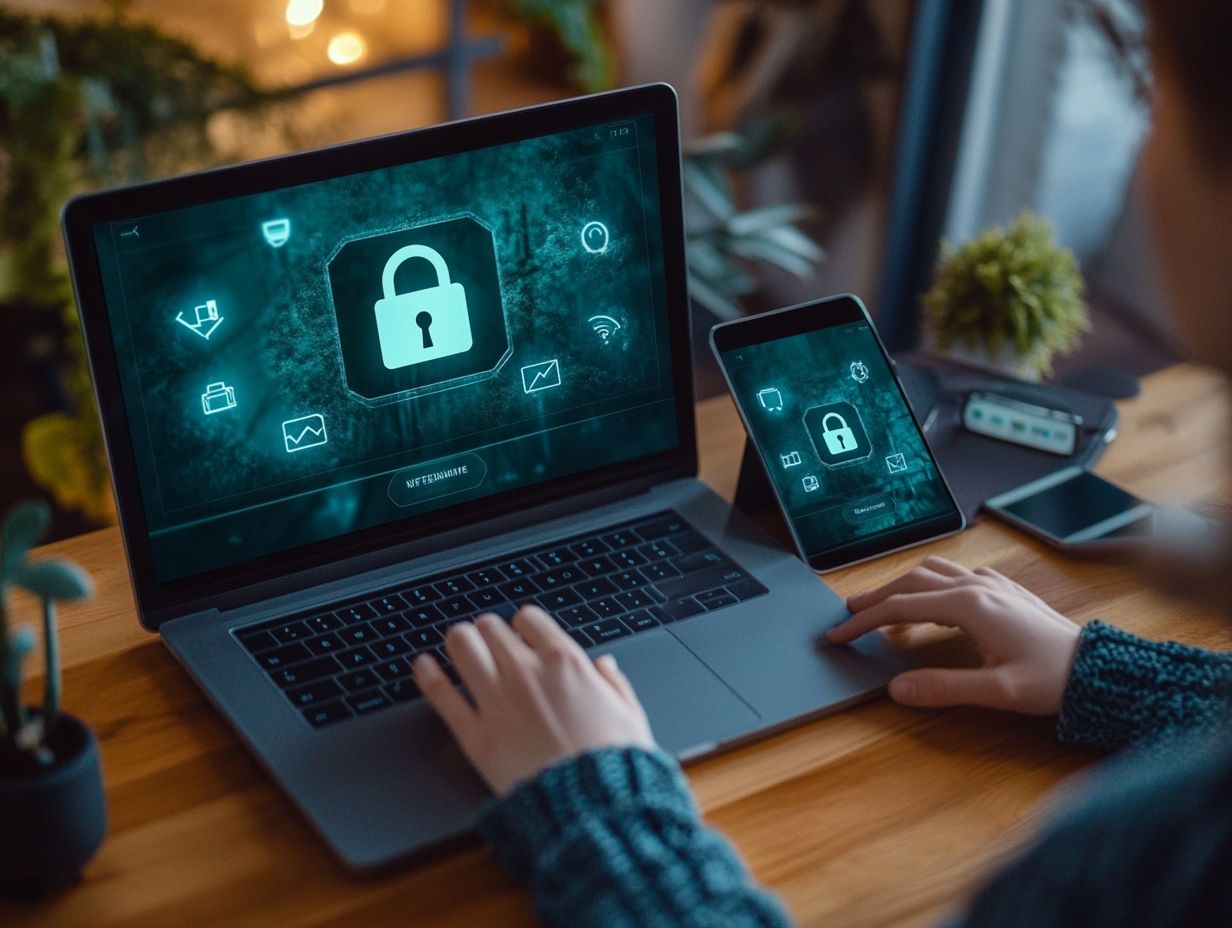
Regular software updates are essential for maintaining your computer’s security and shielding yourself from emerging threats. Both Windows and Mac OS X come equipped with automatic update features that ensure you have the latest security patches and improvements at your fingertips.
Neglecting to update your software can leave your devices exposed. Cybercriminals often capitalize on outdated applications to gain unauthorized access or unleash malware.
If you prefer a more hands-on approach, manually checking for updates is simple. Just head to the settings menu, where you’ll find update options clearly laid out for your convenience.
Investing in robust security software significantly enhances your defense. Renowned programs like Norton and McAfee regularly roll out updates that bolster security and optimize your device’s performance.
These tools work in harmony with your system software updates. This creates a multilayered defense against potential threats, ensuring you enjoy peace of mind knowing you have the best protection at your fingertips!
Using Virtual Private Networks (VPNs)
Using a Virtual Private Network (VPN) client is a smart strategy for establishing a secure connection, especially when accessing public Wi-Fi. VPNs encrypt your data, making it difficult for hackers to intercept any sensitive information on unsecured networks.
VPNs enhance your privacy by masking your IP address and creating a secure tunnel for your online activities. This safeguards your personal information from unauthorized access.
The benefits of VPNs extend across various devices, making them essential tools for both smartphones and computers. If you often use public Wi-Fi, a VPN is not just smart; it’s essential!
Popular VPN clients like NordVPN and ExpressVPN come packed with features such as split tunneling. This allows you to choose which apps utilize the VPN connection, enhancing speed and providing access to geo-restricted content.
By incorporating VPNs into your daily internet use, you can enjoy a safer and more private online experience.
Antivirus and Anti-Malware Software
Antivirus and anti-malware software are crucial elements of a comprehensive computer security strategy. These programs protect you against a wide array of threats.
Programs like Kaspersky, McAfee, and AVG are designed to detect, quarantine, and eliminate malicious software. They safeguard your personal information and maintain the integrity of your devices.
With regular scans and real-time protection, these programs ensure continuous monitoring for potential security threats. They use straightforward methods to identify known threats and detect unusual behavior that indicates new forms of malware.
The advantages of utilizing trusted software extend well beyond basic virus protection; many solutions offer:
- Firewall capabilities
- Phishing detection
- System optimization tools
Automated updates keep your software responsive to the latest threats. By investing in reliable antivirus and anti-malware solutions, you secure not just your devices but also your peace of mind in an increasingly digital age.
Best Practices for Personal Device Security
Adopting best practices for personal device security is essential for safeguarding your internet safety and protecting sensitive information.
Regularly clearing your cache and browsing history enhances your privacy. Exercise caution with downloads and always download files from trusted sources to avoid malware.
Establishing a routine for backing up your data is crucial. This ensures that your personal information remains secure, even during a security breach or device failure.
Prioritizing these measures will greatly enhance your digital security and peace of mind. Take immediate steps to secure your devices today!
Tips for Protecting Your Devices
There are several practical tips you can follow to protect your devices. Each one contributes to better mobile device security and safeguards your personal information.
Start by using strong passwords for all your accounts. Enable two-factor authentication and stay alert against phishing emails these essential steps should never be overlooked.
Ensure a secure connection when accessing sensitive information online. This further strengthens your defense against cyber threats. Regularly updating your software is also vital for your device’s security.
Many updates include security patches that address vulnerabilities. Enabling automatic updates can streamline this process and keep you one step ahead.
Consider using a reputable mobile security app that adds extra layers of protection, such as malware scanning and theft recovery features. Awareness is key make it a habit to educate yourself on the latest cyber threats by following cybersecurity blogs or forums.
For example, understanding the differences between secure and unsecured Wi-Fi networks can significantly reduce risks while browsing or making online payments. By taking these actionable steps, you’ll cultivate a proactive mindset toward online safety, ensuring that your valuable personal information remains safe.
What to Do If Your Personal Device Is Compromised
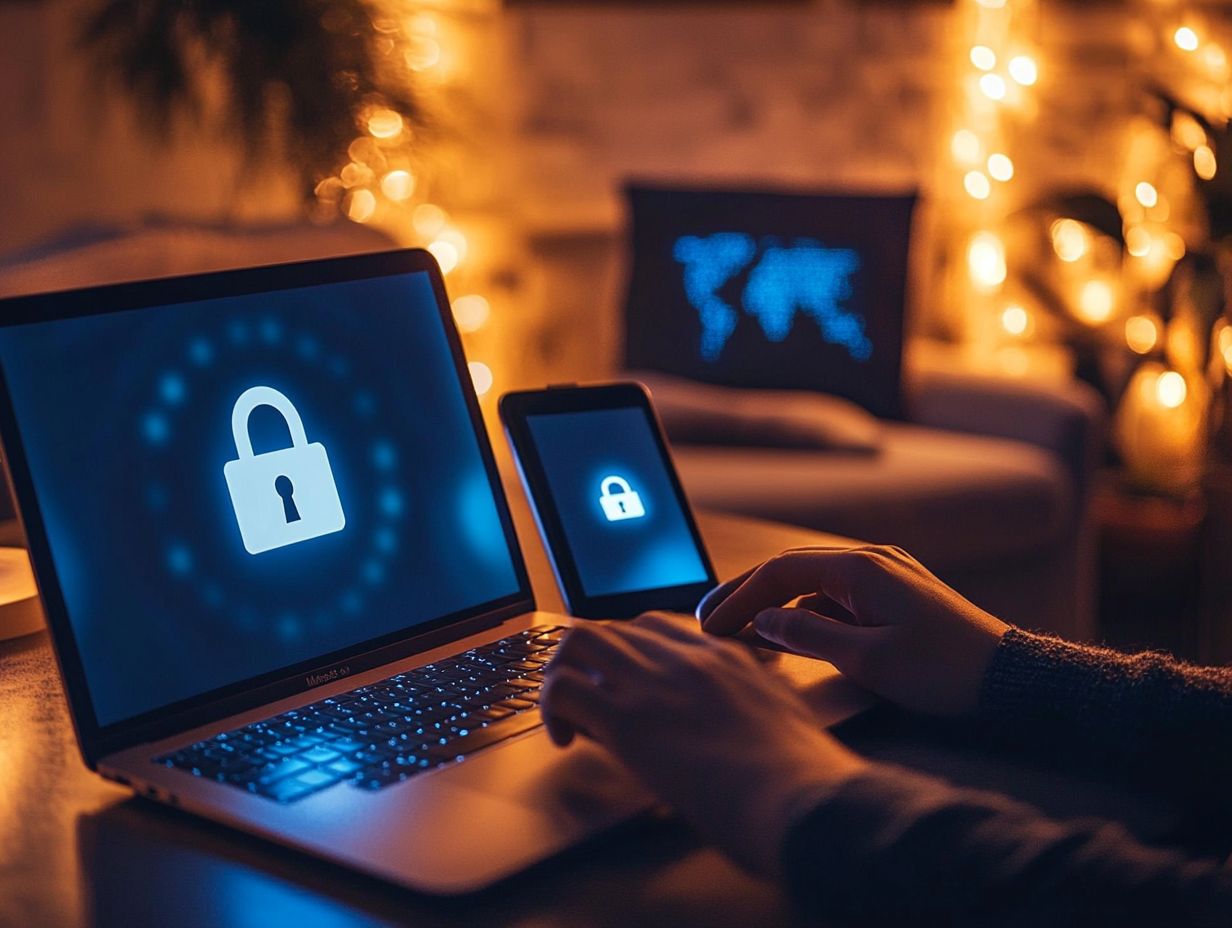
If your personal device becomes compromised, act quickly to regain control and safeguard your information.
Start by disconnecting from the internet to stop any further data transmission. Then, check for any unusual activity or unauthorized access.
Using remote wiping software is an effective way to erase sensitive information from the device, ensuring your personal data remains secure.
Regularly backing up your data can significantly streamline the recovery process, allowing you to restore essential files with minimal loss.
Steps to Take to Regain Control and Secure Your Device
To regain control of a compromised device, follow specific steps to ensure security is restored.
Begin by updating your software and security applications to their latest versions. These updates often contain critical patches for vulnerabilities that may have been exploited.
If sensitive personal information is at risk, consider using remote wiping software it’s an effective safeguard.
Review your security settings and practices to prevent future breaches. Enhancing password complexity is crucial. Create strong, unique passwords for all accounts linked to your device.
Enable two-factor authentication whenever possible to add an essential layer of protection.
Regularly monitor your account activity to spot any suspicious behavior, allowing for timely responses to potential threats. It’s also wise to conduct periodic audits of installed applications, removing any that are unnecessary or potentially harmful.
By fostering a culture of vigilance around your digital practices, you can significantly reduce the risk of future compromises and enhance your overall device security.
Final Thoughts and Recommendations
Final thoughts on personal device security underscore the urgent need for vigilance and proactivity in today s interconnected landscape. Prioritize internet safety and mobile device security by continually educating yourself about emerging threats and implementing best practices.
As cyber attacks grow more sophisticated, adopting a multifaceted approach becomes critical. Routinely evaluate your current security settings, ensuring that your passwords are strong, using a mix of letters, numbers, and symbols.
Enabling two-factor authentication provides an additional layer of protection. Regularly review app permissions and uninstall those that no longer serve a purpose to significantly reduce vulnerabilities.
Staying informed about the latest security trends and updates from reputable tech sources is advisable. By taking these actionable steps, you can build a robust defense against potential breaches, ultimately safeguarding your sensitive information.
Frequently Asked Questions
1. What should I do if my device is compromised?
Act quickly! Disconnect from the internet and use remote wiping software.
2. How can I strengthen my passwords?
Create strong, unique passwords using a mix of letters, numbers, and symbols.
3. Is two-factor authentication necessary?
Yes, it adds an essential layer of protection to your accounts.
Start protecting your devices today!
How can I secure my personal devices?
You can secure your personal devices by following these steps:
- Enable a strong password or passcode.
- Install antivirus and anti-malware software.
- Keep your operating system and applications up to date.
- Avoid using public Wi-Fi networks.
- Use a virtual private network (VPN) for secure internet access.
- Enable two-factor authentication for better security.
Why is it important to secure my personal devices?
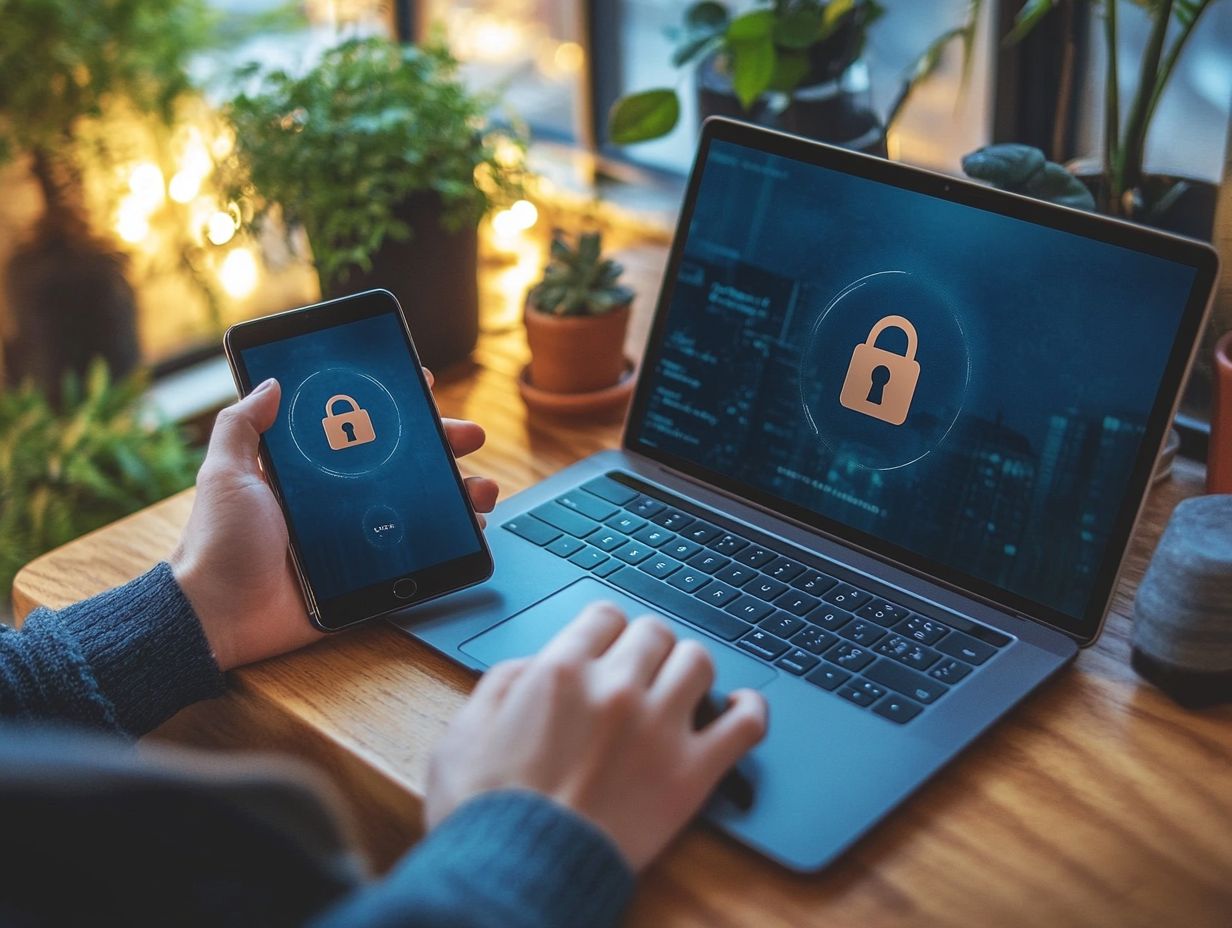
Protecting your personal devices is crucial! It keeps your sensitive information safe from prying eyes and malicious software.
This can prevent identity theft, financial fraud, and other cybercrimes.
What type of password should I use to secure my personal devices?
Use a strong password that mixes letters, numbers, and special characters.
Avoid easily guessable information like your name, birthdate, or pet’s name.
How often should I update my operating system and applications?
Update your operating system and applications as soon as updates are available.
These updates often include important security patches that protect your devices from new threats.
Can I use any public Wi-Fi network to access the internet?
No, using any public Wi-Fi network is risky. These networks are often unsecured, making it easy for hackers to steal your data.
If you must use public Wi-Fi, always connect through a VPN for added security.
What should I do if I suspect my personal device has been compromised?
If you suspect your device has been compromised, act quickly!
Change your passwords immediately and run a full antivirus scan. You may also want to seek professional help to eliminate any malware.

